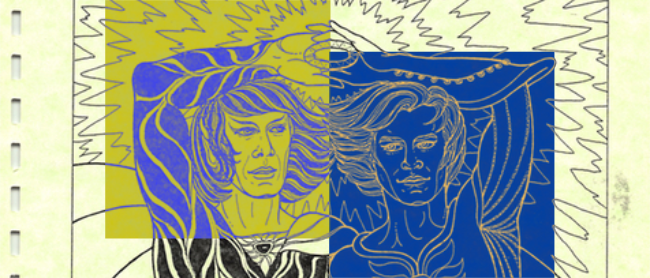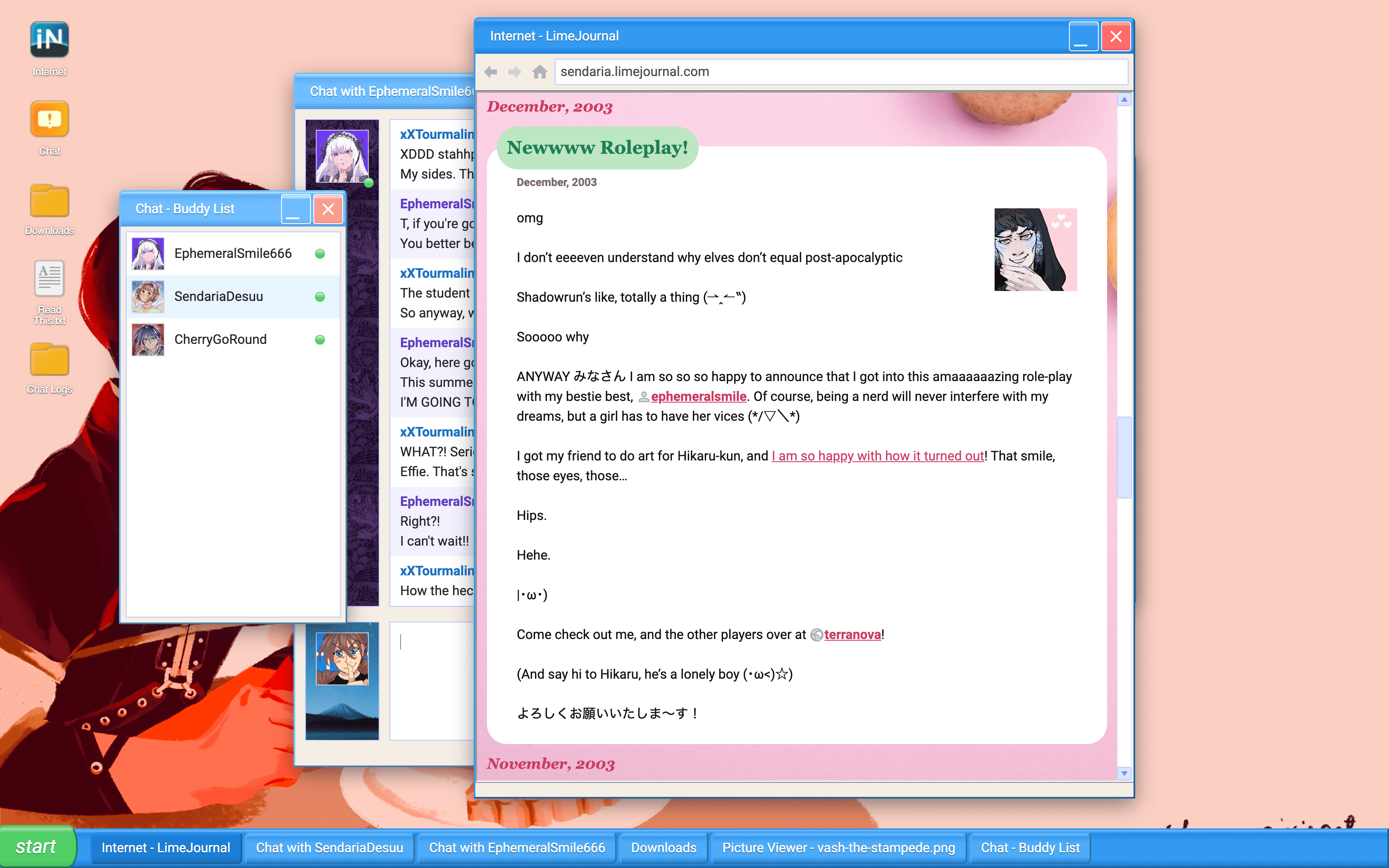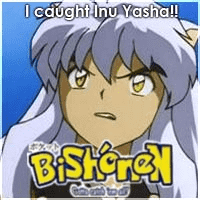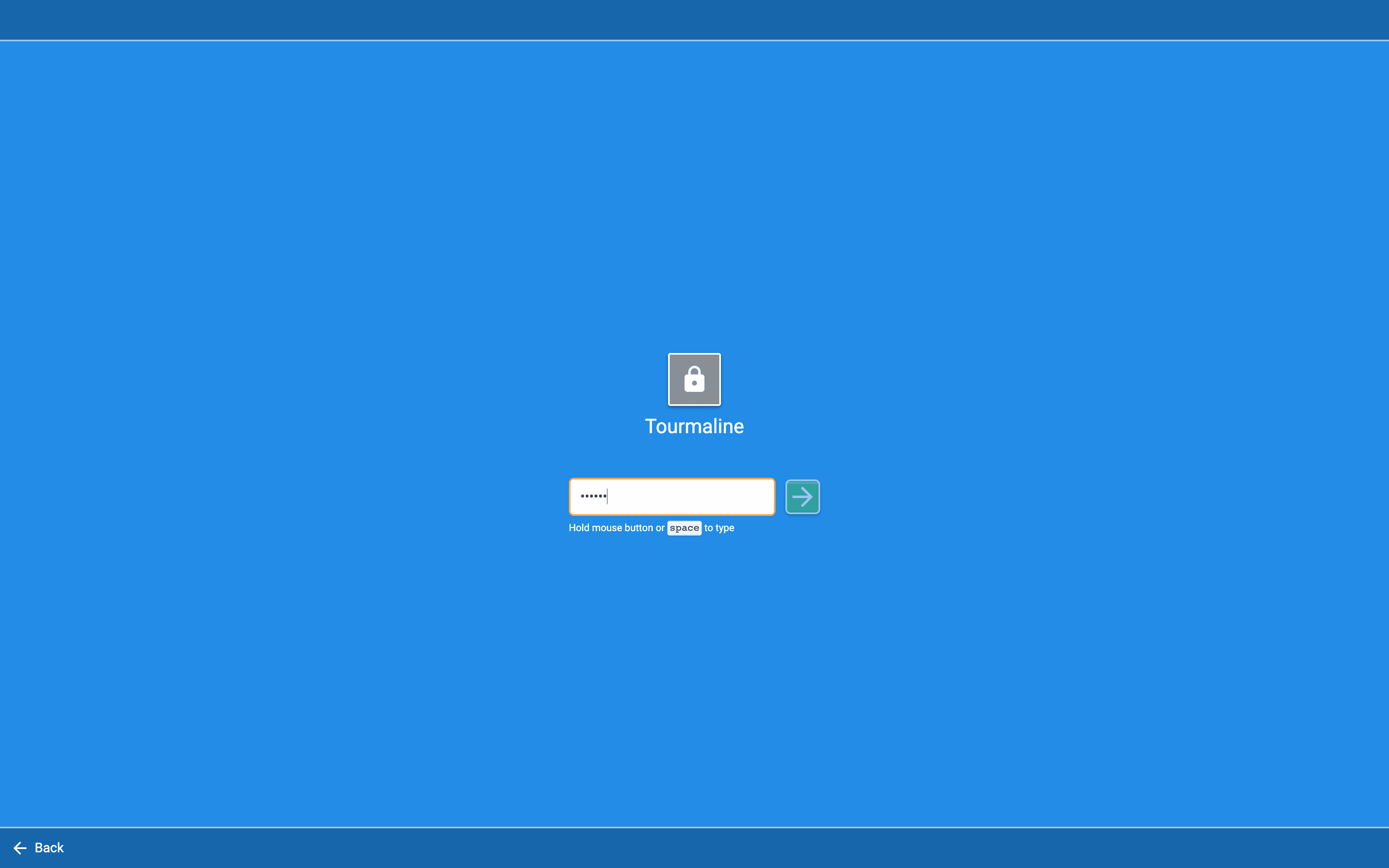The Birth, Death and Rebirth of Slash

Imagine you’re a Star Trek fan in the 1980s.
You like the confident and impulsive captain of the USS Enterprise, Captain Kirk. You also like his partner-in-crime, a straight-laced logical Vulcan named Spock. You've followed their adventures together and while the show calls them "friends," you think of them as...something a little more than that. You thought you were the only one, but you've just returned from your first Star Trek convention and found out there are other people like you — people who “ship” Kirk and Spock.
As in, together.
It's called slash.
You start following the people you met who write slash. Then you start writing it, then publishing fanzines until one day...
The other Star Trek fans take notice, and they are NOT happy about it.
Even the show's creators call you out.
 Gene and the executives at Paramount feel that [slash] is harmful to the STAR TREK concept since this was never the intention in creating the series."
Gene and the executives at Paramount feel that [slash] is harmful to the STAR TREK concept since this was never the intention in creating the series."
I found slash about years later, in my conservative hometown. Through my religious friends at school, I got into "safe for teens" Japanese animation like Pokémon, Dragonball Z and Gundam Wing. I started fantasizing about these characters, and writing what might happen if one were to meet another on a moonlit night. I thought I was alone in my "sinful perversions" but I found through the web a community of kind, accepting individuals who became fast and close friends.
Well, at least in Hell I'll have good company, I thought.
And down the rabbit hole I went.
In the days of the early internet (approximately from 1990-2008), niche communities like slash boomed, partially because they suddenly had a place to connect with other like-minded individuals, but also that slash makers are resilient, DIY people at their core. In spaces that either didn't exist or were downright hostile, they learned printmaking, layout design, and later coding make their own shrines and spaces they could call their own. In the early 2000's, slash communities bloomed on sites like Geocities, LiveJournal and del.icio.us.
My partner and I are working on Terranova, an interactive video game that takes place in the early web of the 2000's. It follows the journey of self-discovery of four girls through their own fan community they made on LiveJournal. It's in beta right now, and will be out around spring 2022. To make the game feel as real as possible, we became amateur anthropologists studying old web slash communities, going so far as to dig into our own external hard drives for saved chats and blog posts.

From this research, I'd like to share what we discovered. Fan communities live, die, and are reborn constantly. A common cycle that occurs is fans finding one another, hacking the space to make it their own, and to respond to threats outside and inside the community. And even though they find themselves migrating to different spaces, tearing down and rebuilding their communities, they persist.
Finding Community
The early internet was decentralized. There were no proactive friend suggestions or algorithms pairing people. In other words, if you wanted to find others who liked the things you liked, you had to use a signal.
Geocities, a site for building your own personal pages and shrines, had “neighborhoods” for different types of interests. In the "Area51" neighborhood, one could find fellow science fiction and fantasy writers, and in the "Tokyo" neighborhood, they could find other anime-lovers. These “neighborhoods” eventually were taken away from Geocities, but the popularity of “webrings" persisted. These were user-generated lists of websites based on an interest or theme.







Another way to signal to others was to use pixel sprites or badges on your personal page. They showed the types of anime you liked or what slash "pairings" you were into. Pocket Bishonen, which is still around today, is a site where you can “catch” different attractive men by answering a 3-question quiz.



In the modern web, signalling within the slash community still exists, though it is much more subtle. It is done primarily via text or emojis on profile bios, such as, "Multifandom・Queer Horror・20 ⬆" In this case, the person has multiple fandoms they are a part of, produces content for those fandoms on the theme of queer horror and only wishes to be friends with people who are age 20 and above. (More on why this occurs later.)
Hacking Until it Feels Like Home
Now that you've found your people through careful signalling, how are you going to participate in the community? One of the main tenets of the slash community is well, to make slash. Because of some of its rudimentary but open-ended technology, the early internet saw the rise of some ingenious uses and repurposes of websites to produce fan content.
Del.icio.us Bookmarking
Because the internet was decentralized, being able to save and bookmark sites was critical to collect new inspiration sources, stay in touch with other fans, and consume slash content. Slash fans used bookmarking tools in ways that were, up until that point, unheard of.
Del.icio.us, in its heyday, was an ingenious bookmarking site that allowed users to “tag” websites for faster searching. Fans could also share the tags they made with others. Normal people might make tags like “travel” or “Japan,” but the slash community repurposed tagging in an entirely different way—using tags to cleverly make notes for themselves and for others.
An example of some tags used on del.icio.us:
pairing:kirk/spock
kink:D/s
chapters-read:12
^allthefeels
crack!fic
Using del.icio.us, fans could search and tag fanfics even if they were published on different sites. They could suggest tags, for instance; when a user started to type pairing:, it would bring up a list of pairings that had already been tagged by others.
Users would leave notes for themselves, for instance, how many chapters they had read, or tagged with "^" or "!" with interesting or notable qualities. This allowed them to expertly search for fanfiction within a single creator or to search for fanfic they had lost links to. In the modern web, Archive of Our Own, or AO3, keeps the intricate tagging system of its predecessor del.icio.us, with a few extra additions.

The "Ask-Verse"
LiveJournal is a blogging platform tailored towards customizability and ease of use. For those who felt building a website from scratch on Geocities was too daunting, LiveJournal offered easy themes and templates that fans could inject their own custom CSS to build a sophisticated site without much coding effort.
LiveJournal released a feature called the "Ask Box" that allowed other users to ask one another questions. It was intended to spark discussion between friends and to help blog writers communicate with their audience. Enterprising Torchwood scifi fans took this new feature and created their own fan lore. It started out with the series' sassy captain, Jack Harness (doesn't it always start with a sassy captain?).
Viewers could send in their questions and someone would roleplay Harkness answering them in his voice. Soon, other people independently began to roleplay other characters from the Torchwood series. They would send in questions to Harkness as if they were that character. And then, relationships, enemies over who stole whose lunch in the breakroom, and new, unique friendships formed, all through the LJ Ask Box. It became a communication vehicle for imagining what day to day life of the agents within Torchwood was like. People collaborated on writing this Ask-Verse even though they had never met each other out of character.

Threats to Slash
Since their inception, slash communities have endured threats to break up or completely erase their creative spaces. The sexual and taboo themes explored in slash as well as the question of legality has caused tension between slash fans and the internet companies that host their content.
We found that threats usually came from two places:
- from outside by corporations that own online spaces
- from inside by bad faith actors within the slash community
The result of these threats were usually mass deletion of fan spaces or fan content or creators leaving the slash community entirely.
From Outside: Del.icio.us Deletes the Slash

In 2010, del.icio.us was purchased by the founders of YouTube and made a change to their site that had monumental implications for slash. As a way of "renewing" the service for new users, they removed many features, one of them being the ability to type the "/" character into the search box. It was clear what the new owners of del.icio.us wanted the site to be and what fans wanted the site to be were at odds with one another. And so, assuming that "most users" were not fans and agreed with them, the owners deleted the "/".
But fandom finds a way. When del.icio.us went down, the fan community got their spreadsheets and got to work. Pinboard capitalized on this incident and poached fans for their site. The creator of Pinboard, Maciej Ceglowski, documented this incident from his perspective in a talk called "Fan is a Tool-Using Animal."

Aside from spreadsheets and Google Docs, a fan made fanficiton about the move, personifying Pinboard as the shy, quiet one who gets all the girls and del.icio.us as the foolish and insecure bro. del.icio.us userbase divebombed, and Pinboard eventually bought it for a mere $35,000.
Though threats from corporations are the most destructive to fan spaces, some of the most long-standing threats come from inside - by bad faith actors within the community.
From Inside: The LiveJournal Strikethrough Incident

In 2007, slash fans woke up to a massive purge of blogs and communities by LiveJournal, known as the Strikethrough Incident, since a deleted user's name, when linked on another site, was shown with a strike through their name. LiveJournal had updated its terms of service abruptly, and blogs that were deemed "inappropriate" had been removed. Along with them, fan sites that posted erotic content, such as Pornish Pixies, were suspended without notice or warning.
Even though the LiveJournal Strikethrough Incident was executed by SixApart, the company that owned LiveJournal, it was linked back in part to a series of complaints they had received from a group called The Warriors of Innocence. You can see one of the original complaints here (Content Warning: text mention of child abuse and child rape).
The Warriors of Innocence were a conservative Christian group dedicated to "protecting children bringing down the perversion that reside[s] on LiveJournal." One of the Warriors of Innocence wrote about the mass deletion:
 Our group tried (and succeeded) to end the liberal idiocy on LJ. Children were viewing these blogs, and were being influenced by immoral behaviours.”
Our group tried (and succeeded) to end the liberal idiocy on LJ. Children were viewing these blogs, and were being influenced by immoral behaviours.”
Later, Anil Dash confirmed the pressure that SixApart had received but reiterated his committment to the community, saying, "we know and love that one of our core communities is the plethora of fen that flourish on LJ. We're not going to deliberately do anything to endanger that... But we do make human mistakes from time to time, especially when we're under the gun to Do Something To Protect The Children."
And yet, even after typing these words, SixApart executed another Terms of Service update and purge known in the fan community as Boldthrough.
The pressure to Do Something To Protect the Children is not new. In 1954, American psychologist Fredric Wertham - in response to the rise of superhero comics - urged comics to self-censor and asserted that homosexual overtones in comics would encourage children to do the same:
 The Batman type of story may stimulate children to homosexual fantasies, the nature of which they may be unconscious.”
The Batman type of story may stimulate children to homosexual fantasies, the nature of which they may be unconscious.”
The modern version of moral panic has, unexpectedly, united trans-exclusionary feminists, ultra-conservatives and young LGBTQ+ teens to produce a new breed of bad faith actors known as "antis." They may not agree completely on ideals, but they are united on the same goal to “protect women and children” in online spaces by reporting, harassing and doxxing producers of slash fanworks. In response to this, many fan creators request on their profile that anyone they interact with be "18 and up" or "20 and up" so as not to provoke the ire of antis.
Owners of online spaces that, while publicly stating they cherish their users, purge content or remove features without warning or consultation of those users.
Bad faith actors that harass others, convinced they are doing so for a higher purpose. These continue to be the threats to the slash community.
This is the circle. Of the life and death of communities. Every circle we travel, some things get gained, and some things get lost.
How We Can Die and How We Could Live

There is good and bad in the road ahead.
The bad news is that the more centralized our internet becomes, the more space is controlled by single companies or owners. This means slowly, the web is being merged under one Terms of Service agreement and, in accordance to those Terms, is subject to mass deletion. Currently, we still have some indie spaces to migrate to if we don't like a platform, but those spaces are dwindling in favor of large-scale social media networks like Twitter and Instagram. If too much of our modern web becomes centralized, there won't be spaces to migrate to when deletions happen and precious fan works, fan histories and communities will be lost.
The good news is that fans are some of the most resilient people I know. As the good Ian Malcom says, "life will find a way," and this, I believe is true for slash in the modern web as well.
There are movements around decentralizing the internet, like IndieWeb and The Yesterweb (and this zine) that are full of DIY creators dedicated to retaking back the principles of the Old Web with what we know now about conscious and equitable community creation.
As for me... I made a game. To remind people what communities used to be like. To encourage them to get in touch with their friends from long ago. And for other generations who don’t remember this time to get involved and get inspired.

